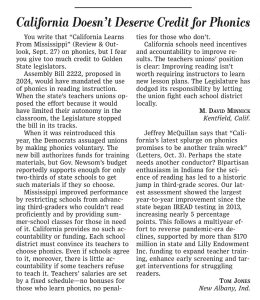Two more letters appeared in the 10/12/25 print edition of The Wall Street Journal on the topic of phonics and California. One of them was in direct response to my letter.
Gift link: https://www.wsj.com/opinion/phonics-is-a-train-wreck-switch-conductors-california-indiana-7db01588?st=S3zaVc&reflink=desktopwebshare_permalink
[see also image]
Both letters illustrate why individual state NAEP scores should not be used as evidence for anything in determining reading policy.
Mr. Mennick’s letter states that California won’t be successful in implementing (more) phonics, in part because they aren’t also doing 3rd-grade retention. Mr. Jones claims that Indiana has been successful in implementing phonics, but also mentions their use of additional teacher training, increased funding for “early screening,” and more “target[ed] interventions.”
The problem here is obvious: How do we know which of these many approaches is causing reading scores to rise—or, in the case of California, failing to rise?
The answer can only be determined by conducting proper experiments, where we control these variables to see what is causal and what is merely correlational. In fact, that’s been done already for systematic phonics, as I pointed out in my letter to the Journal.
I understand that politicians love simplistic comparisons, and a state’s NAEP score gives them that easy-to-explain sound bite. But that’s the opposite of science, as I would hope the “science of reading” advocates would know.


Follow Us!